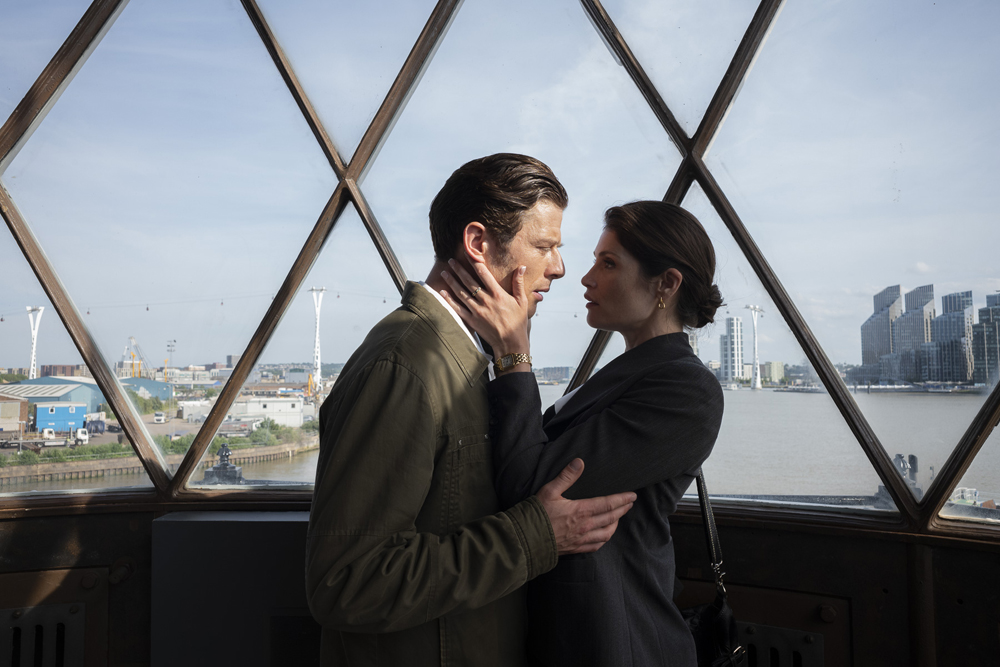“Espionage is storytelling and everyone has a story they want to be told,” coos Alice (Gemma Arterton) in the early going of “Rogue Agent,” keeping an eye on Roger Freegard (James Norton) as he attempts to recruit a new spy named Sophie (Marisa Abela) to the cause. It’ll be some time before she appears on screen herself, a bit of subterfuge on the part of co-directors Declan Lawn and Adam Patterson who are more interested in Alice than Roger, though it is the latter who grabbed headlines during the late ‘90s and early 2000s for using claims that he was an M:I5 agent to seduce and single young women. While Sophie, a student in Shropshire still reeling from a recent wave of IRA bombings, has political interest to take Freegard at his word, Alice, as a lawyer, would seem to be more inclined to ask questions when he sweeps into her life, yet after offering to make “the best bolognese she’s ever had” on a dinner date after a driving her out to the countryside in his Ferrari, she cannot help but let down her guard.
In “Rogue Agent,” Lawn and Patterson are able to disarm an audience in much the same way as they track the conman and imagining his schemes as no different than a romance with an elusive partner, watching as Freegard’s marks are intrigued as much by the mystery around him as perplexed by it, drawing them in further into his deceit. Although Freegard was ultimately exposed, journalist and frequent Paul Greengrass collaborator Michael Bronner dug in a little deeper than the initial wave of reporting on the sordid tale, working on a story that he ultimately decided against publishing because it sounded a little too much like a movie and it now seems like serendipity that a pair of filmmakers who were transitioning out of being journalists themselves would seize upon it for their first feature, honing in on the human drama that anchors the stranger than fiction tale. With the film now in theaters and streaming on AMC+, Lawn and Patterson spoke about what inspired their career move, wrangling the wild true story into a manageable and taut two-hour drama and its ongoing resonance.
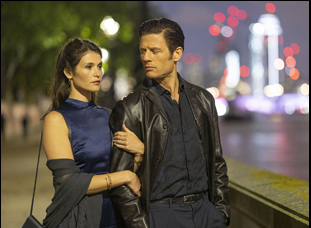
Declan Lawn: We met in 2009 and worked for a program in London called BBC Panorama, which is a bit like PBS Frontline in America, making a lot of investigative documentaries together, and basically journalism is about how the world works and dramas are about how people work. Adam and I, in our work over the years, we were always very interested in character, but as a journalist, that’s not really what you’re there to excavate. You’re there to hold power to account, so there came a point in about 2018 where we really felt the need to branch out and make a short film together.
Adam Patterson: Yeah, we didn’t feel creatively fulfilled in the world of journalism. We love journalism and it’s really important and we love what it gave to us, but in terms of our creative aspirations, we really wanted to focus on character and drama offered a new creative framework for us, so that’s what tempted us. And we had a meeting with Kitty Kaletsky, James Norton’s producing partner a couple years ago, just before lockdown, and she told us the story of Freegard and we were just like blown away. As two career journalists, we never heard a story as crazy as this, so we immediately were attracted because it was a true story and had amazing characters involved, so it could be a great character drama. Then we read Michael’s script — and it’s a great script — and we thought our biggest challenge now is to turn this into a two-hour drama because he had the relationship with the real people and wanted to tell the stories in a justful way, so he put in everything. We had to somehow retain that respect for the real people, but somehow helm it in a genre and a two-hour thriller with all the twists and turns required to keep people’s attention.
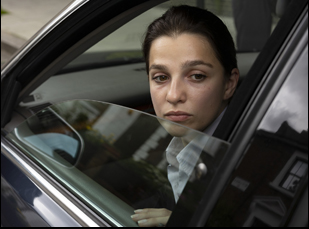
Declan Lawn: Yeah, there was a real litigation lawyer in Michael’s research who we were very attracted to, a very strong character who was instrumental in the end at taking Freegard down. We were very drawn to this idea of a person who initially is a victim but refuses to see or accept herself as a victim and decides she’s got to do something about what’s happened to her. And as Adam said, you’ve always got to think about genre, and the first genre that came to mind was the cat-and-mouse psychological thriller, all that kind of one-upsmanship, so from very early on in our involvement, we thought that’s it.
Adam Patterson: And the only way we could really do justice to the victims was by giving enough screen time to one victim to show how this could happen to me or you. Alice is us, so how does it happen when she’s super bright and super tough? Is it a case that she’s an idiot? No, she’s very smart. It’s just [Freegard] somehow sees that void, that vulnerability and says why don’t you run away with me, be your own boss, you can be free. He takes her to the coast, the great unknown and says, “This can all be yours.” It’s a very simple thing, but it’s exactly what she needed to be told in her life to actually start believing in him. That’s the genius that he has and the only way we could do it is to make it Alice’s film.
You’ve been showrunners before, but that doesn’t necessarily mean working with the actors as intensely as you likely had to here and James was onboard from the very start. Was it a new experience for you?
Declan Lawn: Yeah, James was the original producer on this project and we came much later than that, but we were big fans of him as an actor. James obviously has these leading man good looks and could probably just spend the rest of his life playing chiseled handsome leading men, but he’s always had this interest in exploring the dark side of people, so one of the big reasons we wanted to do this was we knew James was attached and we knew that he had the range and the talent to pull this off.
Adam Patterson: Of course it’s slightly intimidating when you’re first-time directors. A lot of stuff is new. You’re in a new world, doing this thing you’ve wanted to do for a long time and what you really want is to be totally confident in your cast and in James and Gemma came two people who completely bought into the roles. James, because he’d been on the project for a few years as a producer, had been doing a deep dive into the psychology for a long time andwe had so much time with him even before we cast Gemma, and then Gemma came on and they both gave so much time to prep and rehearsals because their chemistry was so important. The silent moments and the Judas Kiss when there was so much going on behind the eyes and there’s big moments in the film with no dialogue — that requires a certain talent of actor, but also a certain confidence to let those moments go unspoken and they both obviously were brilliant at that, so we were very lucky to have both of them. It helped guide us on this first voyage as directors.
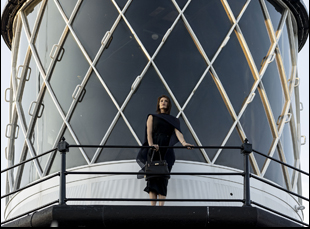
Adam Patterson: Yeah, we covered something like 27 locations in 29 shooting days. I don’t think we ever want to do that again. [laughs]
How did you find the lighthouse?
Declan Lawn: That place is real and we knew that place existed and we knew the story behind the Tibetan music bowls, so it’s one of those things that as a writer, it bubbles up somewhere as part of your subconscious and what attracted us to [the room with the music bowls] is that it’s a thousand-year composition that never ends, so it’s a little bit like Freegard or any sociopath in that it never changes, it never ends, it goes on forever, no matter the circumstances. Even when Freegard’s in prison, he’s still spinning lies and illusions and when we went in and looked at it, we thought this is going to look wonderful…
Adam Patterson: He’s also getting her to look at her life as a city lawyer and they’re up and literally looking across at the city of London, so the location was perfect for that. But you were also maybe talking about the lighthouse where he was dancing [to George Michael’s “Faith”], that was actually two locations that were a composite, down in Dover on the south coast of England. There’s a lighthouse where they’re driving a Ferrari, but the interior is actually a watertower 300 miles away and it was a big search for an interior that could be a nice enough romantic getaway that he would seduce her in, but also an interesting architectural space for our amazing cinematographer Larry Smith to work in. We got so lucky with the two levels. We didn’t sketch it like that before we saw it, but when we saw it, it was a winner.
You mention the Ferrari and Freegard has a scheme in the film to open a car service company. Was that the kind of detail you could seize on to have some fun? There are a lot of different cars in the film.
Declan Lawn: Yeah, cars were a huge part of his life.
Adam Patterson: People ask a lot why did he do this and he took a lot of money, but the real reason he did it, I feel, is because of manipulation and control. He just fed on people’s need to need him. He took away so much from people’s lives that the only constant was him. So what did he do with the money? He splurged it. It was always fancy watches and new cars and fancy suits.A nd we wanted to reflect in the film he wasn’t completely suave and slick. He did show vulnerability and he definitely had the trinkets of success, which were markers for women like Alice to say, “Oh, he’s doing okay.”
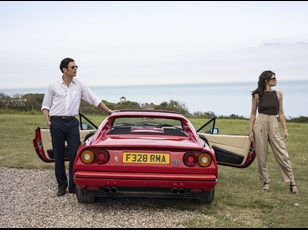
Declan Lawn: It feels really good. It’s done very well in the UK on Netflix and we’ve had a great deal of feedback from audiences who have found it gripping and compelling. There were definitely times during the shoot where we were just hoping that we would get to the end and a big reason for that was COVID. It was a COVID shoot, so we always felt a little bit like we had a sword hanging over our heads and if the infections got on the set, we didn’t know what was going to happen, but we got to the end of it with a great sense of relief. Now to have a film at the end of it that people really seem to respond to, I still feel relief actually. [laughs] That’s probably my overwhelming emotion.
Adam Patterson: I just think we’re very proud. It’s an important story, especially in the contemporary world where people are talking more about these issues of gaslighting and this could happen to any of us. Even though Freegard was a master tactician whose story was unique in some respects, the things he did sadly are orchestrated by lots of people and we should be talking about these issues, so we’re very proud that we delivered on that within an entertaining dramatic thriller.
“Rogue Agent” opens on August 12th in Los Angeles at the Encino Town Center and New York at the IFC Center. It will also start streaming on AMC+.




